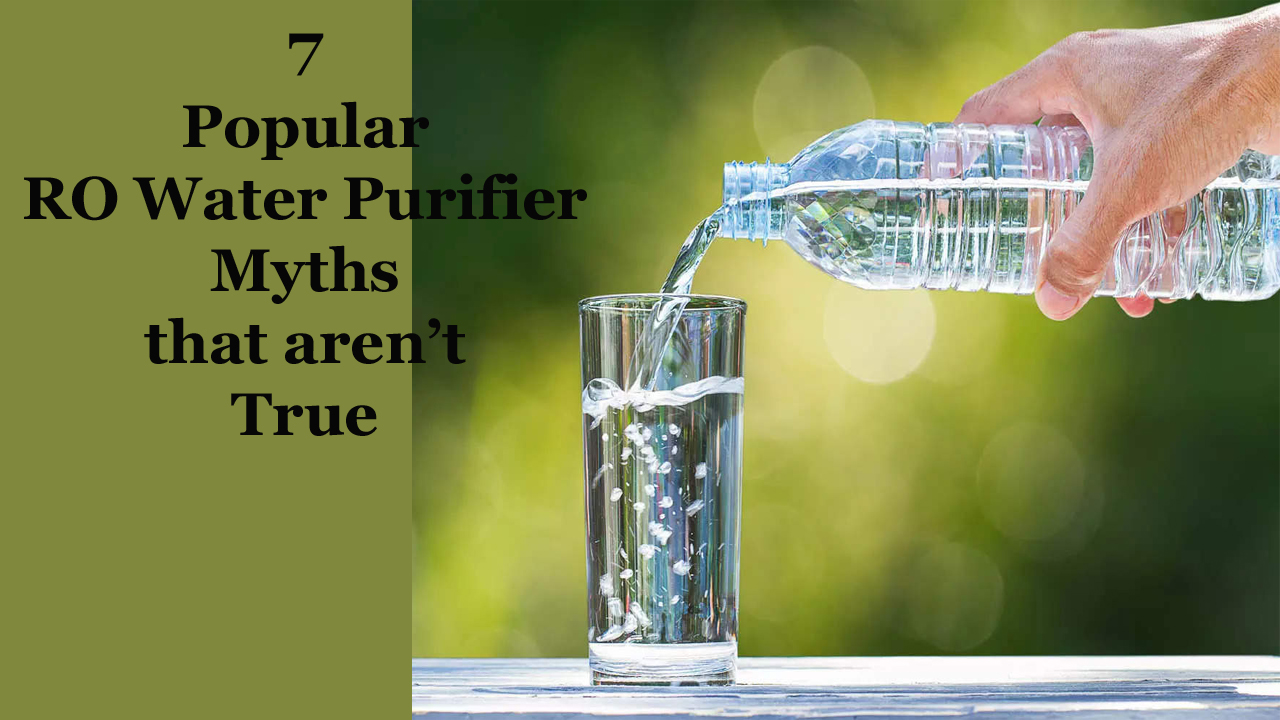Are you aware that people usually consider RO purifiers to be inefficient despite so many proven facts about their advantages?
No, right?
Well, it’s the truth because many think that RO filters cannot remove germs or might alter the taste of the water. There are several speculations about this particular water purifying technology that can be considered a lack of knowledge. People are accustomed to using UV filters or normal gravity filters, so they haven’t given enough attention to the RO technology. It is way more functional and efficient than the other purifiers.
Therefore, you should know the facts regarding this purification technology. In this article below, we have discussed some of the most popular myths people believe in and explained the truth. This will give you enough clarification so that the next time you want to buy a purifier, you won’t strike the RO products from the list straightaway.
7 Popular RO Water Purifier Myths that aren’t True
1. RO purified water cannot eliminate germs and microbes from the water
- Myth: Many people think that the RO purification systems cannot eliminate the germs and microbes from the inlet water supply. However, no matter what the source of water supply is at your home, it will contain germs of different kinds like protozoa, bacteria, fungal spores, etc. Drinking such water will put your health at risk and disturb the taste of water. Unfortunately, the RO purifiers can’t remove them from the water because the filter has large pores through which these microorganisms can pass easily.
- Truth: In reality, these RO purifiers are a lot more than what can be perceived by the eyes. Rather, the filter comes with semi-permeable membranes where the open pores are extremely small and have a diameter in microns. Therefore, they can stop the microorganisms from passing through the filter. Besides, if certain viruses pass through, either the UV lamp chamber or the UF filter will eliminate them, thereby ensuring that the dispensed water is biologically purified.
2. RO purifiers will filter sediment and other such physical impurities
- Myth: The concept of filtration comes from filtering a mixture having undissolved solutes and a liquid. When poured down a filtration membrane like the sieve or filtration paper, the sediments will be collected while collecting the clean and transparent liquid at the bottom. Many people consider the RO technology to be manufactured based on this theory to separate sediments from the incoming water supply.
- Truth: The RO filter is not the first unit where the water is given as the input. It needs to go through a sedimentation chamber where most of the undissolved particles settle down at the bottom of the chamber owing to gravity. The rest of the clear liquid (not having undissolved impurities) then passes through the RO membrane for further purification.
3. RO filters won’t allow the minerals to pass through the membrane
- Myth: Another major speculation concerning the RO filters is that they eliminate the essential elements and vitamins from the water. Therefore, the water that passes through doesn’t have the required mineral content, so drinking the water is not good for health.
- Truth: The truth, however, states that the pores of the semi-permeable RO membrane have enough size to allow the vitamins and minerals to pass through. In addition, however, RO will stop heavy metals, insoluble compounds, and other such chemical impurities whose sizes are larger than the water molecules.
4. It takes a lot of time for the RO purification to remove impurities from water
- Myth: People usually believe that since the RO membrane is partially permeable and has small-sized pores, it will take the appliances a long time to purify the water. Therefore, the appliance will consume a lot of electricity. You will have to wait a long time until one liter of the water gets purified.
- Truth: Yes, this is a myth because the RO membrane does not have anything to do with the speed of water flow. Rather, it is completely controlled by the pump pressure, inlet pressure, and the current consumed. So, if any of these factors drop down the threshold value, the filter won’t perform as per the expectations.
5. RO purifiers won’t last for too long and will show signs of damage sooner
- Myth: Many people think that the impurities blocked by the RO membrane will damage the filter and won’t allow it to use for a long time. However, the impurities getting deposited surrounding the filtration membrane will damage the part, rendering it inefficient in purifying the water.
- Truth– The RO membranes are meant for removing chemicals and microbes from the water and not the physical impurities. As a result, you shouldn’t have to fear them getting damaged due to the hypothetical accumulation of impurities.
6. These purifiers cannot remove hardness from the water
- Myth: One of the worst myths about RO purifiers is that they are used only for removing chemicals and microbes. Therefore, if the supply is getting hard water, one needs to use the water softener to eliminate hardness.
- Truth: This is not the truth because the hardness is due to insoluble salts of calcium and magnesium. Therefore, their sizes are larger than the water molecules, so the RO membrane itself will block them. So, the filtered water will be soft, and you won’t have to use any softening chemicals.
7. RO purifiers are costly and hard to maintain
- Myth: It is one of the most common myths where people believe that the RO purifiers are very expensive and will cost a lot. Besides, they also think these products need extreme maintenance levels, which is why they usually avoid getting the purifier.
- Truth: In reality, the RO purifiers will be worth your investment as they can last for a long time and will ensure that you won’t have to drink impurity-laden water. Also, you don’t need to go to extra lengths to maintain the RO water purifier.
Conclusion
The above article has busted the top seven and most common myths surrounding the RO purifiers. But, as we have mentioned everything you need to know, we are certain you won’t outcast the RO purifier from the list.

